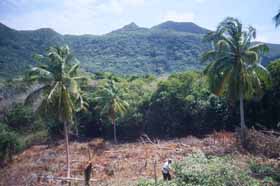|
This is an archived article. For
the latest news, go to the Advance
Homepage
For more archives, go to the Advance Archive/Search Page. |
||
|
Graduate Students Travel Around
the Globe in Pursuit of Studies Christine
Cooper What made this conversation unusual was the language: everyone was speaking in Latin. That's one of the reasons graduate student Christine Cooper decided to take the course given by the Pope's Latinist in Rome last summer. It would surely help with her dissertation on translation of religious texts from Latin to English in 15th century England, and add a new dimension to her teaching of introductory Latin. Cooper is among the many graduate students at the University who spend time abroad doing research, taking classes, attending conferences, or even teaching. Some students choose programs overseas to learn more about their area of study, while others travel to far-away places to conduct library research or because the region is the subject of their field work. Cooper, a Ph.D. candidate in medieval studies, was one of about 40 students from North America, Europe and Asia who took part in Summer 2000 in Rome, a free course designed for advanced students and teachers of Latin. The two-month immersion course was given by Father Reginaldus Foster, a Latinist for the Vatican's Secretary of State department, who translates the Pope's correspondence into Latin. His philosophy is that Latin is a vibrant, living language, says Cooper. "Most people think it's a dead language and only useful for people who are going into biology or study classical literature," Cooper says. "To treat it as a spoken language is something I had never done before." The students met every day for up to eight hours - speaking, reading, and translating Latin. On Sundays, there were half-day or all-day trips to places of Latin interest. Cooper, who usually only sees classical or medieval texts, enjoyed translating modern texts, such as recent Vatican documents and modern Latin poetry. She also liked "translating wacky headlines from the newspaper into Latin. Not only was this a vocabulary builder, but it made us realize that Latin really is flexible enough to express modern concepts and ideas." Jorge
Ruiz Ruiz, a Ph.D. student in natural resources management and engineering, his wife Maria Fandino, and their guide spent hours counting and measuring trees in one of the rain forests on Old Providence Island, a tiny island in the Caribbean. An offshore possession of Colombia, the island has an area of about eight square miles and a population of about 4,000.
Ruiz wants to determine whether a new conservation area should be considered, or at least a revision of present boundaries. "In spite of its small size, the island hosts a number of endemic species, has the second largest coral reef in the Caribbean, and is frequented by almost 80 species of North American migrating birds," Ruiz says. Currently, less than two percent of the island mainland is protected: a national park, mostly in a shallow marine zone, and a smaller park located at a high plateau." Ruiz says the smaller area shows signs of intensive human intervention, and there are important elevation gradients and ecosystems not represented in the current set of protected areas. Ruiz is creating a Geographic Information System database, which will be the product of integrating Global Positioning System measurements, satellite remote sensing, paper maps, aerial photo interpretation, population census data, and field verification. "Conservation strategies in Latin America haven't been effective because of the complex relationships between the local population and park authorities," Ruiz says. "It is important to address the problem from both a social and ecological perspective." Maki
Yamane After completing her coursework, she was developing her dissertation project when she received an offer to teach English at Niigata Women's College. Since her dissertation concerns the acquisition of English as a second language, it was an ideal opportunity to collect data and get a jump on the academic's professional life. She has been able to study how adults pick up the subtleties of English grammar, especially where it differs from Japanese. Finishing a dissertation while teaching a full load of courses can be challenging, but Yamane is making good progress, and will publish a paper on some of her findings in the proceedings of the 2001 Tokyo Conference of Psycholinguistics. Yamane found that the library at the college was not well stocked with the journals she needed, so access to UConn's research resources on-line has been a real boon. She also communicates with her advisors, linguistics faculty members Diane Lillo-Martin and William Snyder, by e-mail. And visits with them when possible. Each of them has occasionally traveled to Japan, and Yamane comes back to UConn twice a year. Sherry Fisher |

